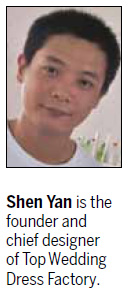Business
More women purchasing gowns for their big days
Updated: 2011-08-15 10:47
By Yan Yiqi (China Daily)

BEIJING - On the third floor of a tile-roofed house at the end of a nondescript alley in Suzhou, six young women sit at computers taking orders from around the world. In an adjacent room, sewing machines hum as white wedding gowns come off the production line in the 30-square-meter workshop. Shen Yan, founder and chief designer of the Top Wedding Dress Factory, said the workshop produces up to 1,200 dresses a month, at an average price of 1,000 yuan ($156). Once they are hanging in a Western wedding dress shop, three or four weeks later, they will have a price tag of at least $1,000.
In the Huqiu district of Suzhou, eastern China, at least 1,000 such factories have sprung up. They sell wedding dresses online, and almost all their customers are from overseas.
"We have online shops on all mainstream business-to-customer platforms like cn.made-in-china.com, Dhgate.com and eBay," Shen said. "Most of our clients are from Britain, the United States and Russia."
Just type "wedding dress" into the search engine of DHgate.com, one of the largest business-to-consumer platforms connecting overseas buyers with Chinese sellers, and more than 468,000 entries pop up.
After ordering and paying, most customers will have their dresses in 25-35 days.
DHgate.com claims it handled orders worth more than $10 million last year, most of the customers being from developed countries, including the US and Europe.
"Almost 80 percent of the world's wedding dresses are from China, and Suzhou produces 80 percent of that," said Chen Weijin, chief editor of hsw365.com, said to have the largest number of users among China's wedding dress websites.
"Apart from the very expensive high-end ones, it is hard to find a wedding dress not made in China," Chen said.
Exports account for virtually all of the business of the 20,000 or so wedding dress companies in China, Chen said.
"Without exaggeration, almost all companies rely on overseas markets," Chen said. "There are companies that do business in the domestic market, but about 95 percent of them still focus on overseas markets."
There is little doubt about what attracts the companies to overseas markets: higher profits.
"An average wedding dress in China costs no more than 500-600 yuan, but our products can be sold as high as 1,000 yuan overseas," said Liu Tianren, general manager of Suzhou Yaoyi Wedding Dress Company.
Liu's company, with about 60 employees, makes 30 to 40 wedding dresses a day.
"When we sell to domestic customers we need a physical shop, which costs a huge amount," Liu said. "But for overseas business, with everything done online, all we need is a computer and the Internet."
Shen of Top Wedding Dress attributes the lack of sales at home to the lack of a wedding dress culture.
"Most Chinese would rather rent a wedding dress because they won't be wearing it for a second time. This has largely kept down the demand for wedding dresses in China."
But Shen and other wedding dress makers may be missing out on a huge market.
The deputy secretary-general of Suzhou Wedding Dress Association, Lu Ming, said that with improved living standards and people's minds opening to Western culture, an increasing number of brides are choosing to buy wedding dresses.
The country's largest congregation of wedding dress retailers is in the Huqiu district of Suzhou, and more than 2,000 visitors flock to their stores every day in the busiest periods.
In the Huqiu store of Knightly Wedding Dress, one of the leading wedding dress companies in China, turnover averages 600,000 yuan to 700,000 yuan a month, said Tan Jinjiao, its sales manager.
"In peak seasons it can be higher."
Ji Hui, 24, and her 26-year-old fiance, who live in Shanghai, plan to hold their wedding ceremony in January and were in Suzhou
recently on a two-day wedding dress buying expedition.
After searching, fitting and bargaining, Ji bought a white wedding gown, evening dress and a party dress for her maid of honor from a store in Huqiu for 800 yuan.
"On this once-in-a-lifetime occasion I really want my own wedding dress," Ji said. "And, after all, the dresses are inexpensive."
Ji's thinking seems to mirror a large segment of the national wedding dress market. According to an online survey conducted by the Chinese web portal 163.com, 46 percent of 17,957 people surveyed said they would buy a wedding dress for the big occasion.
"It is hard to imagine that six years ago almost no Chinese bride would have considered buying a wedding dress, instead opting to rent one," said Shi Kangning, chief administrative secretary of the Working Committee on Wedding Trade under the China Association of Social Works.
"Newlyweds are willing to spend 31 percent of their savings on their wedding activities. To be more precise, about 90 percent of newlyweds would like to spend 15 percent of their wedding budget on buying wedding dresses."
Shi said that between 18 million and 20 million people marry in China every year, and it is predicted that soon the market value of the wedding dress industry will be as high as 300 billion euros a year.
If Chinese companies focus more on the domestic market, "I am sure there will be more work opportunities and large profits", Lu said, adding that Chinese wedding dresses are losing their competitive edge overseas because of rising labor, material and transport costs.
Chen of hsw365.com said the lack of branding and original designs is hampering the industry in China.
The lack of brand awareness can be attributed to the fact that most manufacturers use ready-made designs, he said.
"China's wedding dress industry is no longer in its infancy. But only 5 percent of the companies have sound brands and stick to original designs, and that is a huge problem."
In Shen's factory there are thousands of styles of wedding dresses. But most of them, he said, are made with designs tailored to his clients.
"I was a fashion design major, but most orders come with designs, so I rarely have the chance to design. So we do not have our own brand - just a factory name."
Lu feels the problems with brand awareness will soon be solved.
China Daily
(China Daily 08/02/2011 page14)

Specials

Star journalist leaves legacy
Li Xing, China Daily's assistant editor-in-chief and veteran columnist, died of a cerebral hemorrhage on Aug 7 in Washington DC, US.

Robots seen as employer-friendly
Robots are not new to industrial manufacturing. They have been in use since the 1960s.

Smurfs up in China
The movie remake of a classic 1980s cartoon series is expected to have special cross-generation appeal to Chinese filmgoers